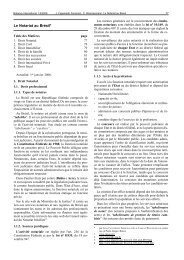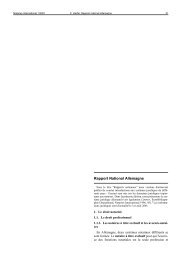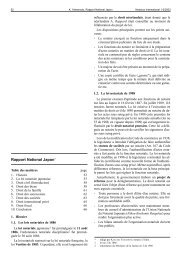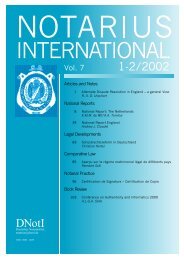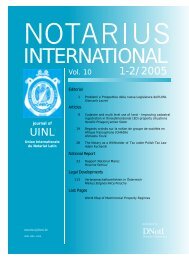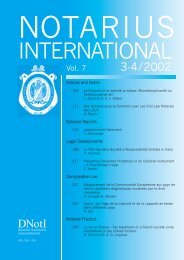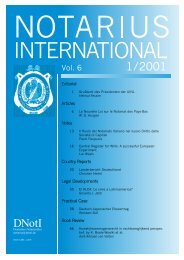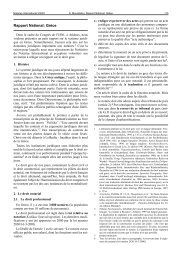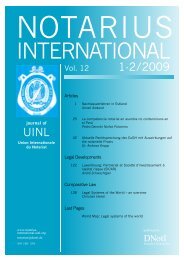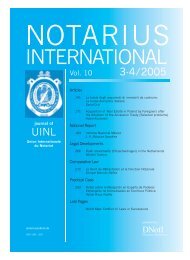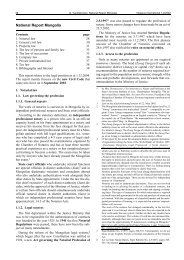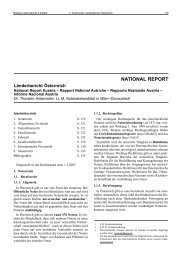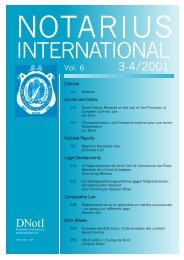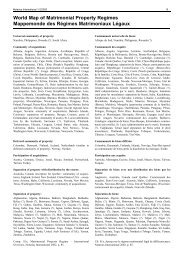National Report Mexico - Notarius International
National Report Mexico - Notarius International
National Report Mexico - Notarius International
You also want an ePaper? Increase the reach of your titles
YUMPU automatically turns print PDFs into web optimized ePapers that Google loves.
<strong>Notarius</strong> <strong>International</strong> 3-4/2005 J. A. Márquez González, <strong>National</strong> <strong>Report</strong> <strong>Mexico</strong> 215<br />
ment for a court order for their protocolisation and confining<br />
the need for such an act only to cases in which the<br />
documents in question do not contain an apostille or a<br />
consular certificate. Furthermore, a trend appears to be<br />
starting whereby the notary himself can carry out the protocolisation<br />
if he knows the language (or any other dulyidentified<br />
person, who need not be an official expert).<br />
Naturally, the final purpose appears to be to harmonise<br />
these matters at national level with the international treaties<br />
and conventions that <strong>Mexico</strong> has signed.<br />
7. Tax Law<br />
7.1. Transfers of immovable property<br />
The notary is responsible for the payment of the taxes<br />
deriving from the operation in question in accordance<br />
with the provisions contained in the Ley del Impuesto<br />
Sobre la Renta (Income Tax Law) and articles 14 and 14-<br />
A of the Código Fiscal de la Federación (Federal Tax<br />
Code).<br />
The income is the total amount of the consideration obtained<br />
precisely from alienation. If there is no consideration,<br />
that amount will be established at an appraisal value.<br />
Exceptions to this rule on income from alienation<br />
consist of the hypotheses of transfer of property mortis<br />
causa, donation or merger of companies and alienation of<br />
certain credit instruments that have given rise to interest.<br />
The complexity of the procedure for calculating the<br />
annual tax depends on the transaction in question. However,<br />
it may be said, in brief, that the deductions provided in<br />
article 148 of the same law must be applied. These deductions<br />
relate to the updating of the acquisition cost, which<br />
will never be less than 10% of the total amount of the<br />
transaction. Investments in constructions, improvements<br />
and extensions and even notarial costs, taxes, fees and appraisals,<br />
commissions and agency fees can also be added.<br />
When these deductions have been applied, the resulting<br />
difference is referred to as the profit. Nevertheless, this<br />
profit must then be divided by the number of years between<br />
the beginning and the end of the transaction, in<br />
other words the acquisition date and the actual date of alienation,<br />
which period must not exceed twenty years.<br />
The notary makes provisional payments for the alienation<br />
of immovable property in accordance with a pre-established<br />
tariff that is the result of dividing the profit by<br />
the number of years between the acquisition and the alienation.<br />
The result is multiplied by the number of years.<br />
The notary has a term of fifteen days from the date of<br />
the signature in which to make this provisional payment,<br />
always under his liability.<br />
7.2. Income from acquisition of assets<br />
This income is provided in article 155 of the Income<br />
Tax Law. Deductions may also be made in this case, in<br />
accordance with the provisions contained in article 156,<br />
but it should be made clear that the provisional payment<br />
amounts to 20% of the income received. The notary also<br />
has a term of fifteen days in which to make this provisional<br />
payment, always under his liability.<br />
7.3. Value Added Tax (IVA)<br />
This payment derives from transactions considered to<br />
constitute alienation (articles 14 and 14-A of the Federal<br />
Tax Code).<br />
Exceptions consist of transfers of property due to decease<br />
and donations. The tax is also not payable when only<br />
the land or constructions intended for housing are alienated,<br />
except in the case of hotels (article 9 of the Value<br />
Added Tax Law).<br />
The code considers that the moment of alienation must<br />
be considered to be the moment when the considerations<br />
are actually collected. From that point onwards, there is a<br />
term of fifteen days in which to pay the tax. This tax is<br />
calculated by applying a rate of 15% to those values and<br />
is payable by the taxpayer, who transfers it to each separate<br />
person acquiring the assets or enjoyment of the assets<br />
or the services.<br />
7.4. Transfer of ownership<br />
Locally, the tax known as transfer of ownership is<br />
payable for all acts in which the ownership of immovable<br />
property is transferred, including due to decease and contribution<br />
to companies, transfer of real rights, awards,<br />
positive prescriptions, exchanges, trusts, division of coownership<br />
and dissolution of property held jointly by<br />
spouses – on the surplus part.<br />
For calculation of this tax, an appraisal value issued by<br />
a qualified expert is taken as a base. The tariff varies in<br />
each federal state of the Republic, but ranges from 0.50%<br />
to 2% of that value. The term for payment of the tax may<br />
also vary, but the longest term is thirty days. The notary<br />
assumes joint and several liability with the taxpayer for<br />
the calculation and payment of the obligation.<br />
7.5. Entry of documents at the registry<br />
Finally, fees derive from the entry of documents at the<br />
Public Land Registry, provided that they contain acts<br />
relating to immovable property or real rights. The tariffs<br />
normally vary considerably from state to state, according<br />
to whether the rates are fixed or whether they are established<br />
as a percentage or in terms of minimum salaries.<br />
Minimum and maximum tariffs may also be established.<br />
7.6. Tax on successions and donations<br />
In this case, no special taxes are payable and it is therefore<br />
necessary to resort to the general rule established in<br />
the above paragraphs. We should clarify that donations<br />
between spouses or between family members in a straight<br />
line of descent – with some exceptions – and, in general,<br />
all other donations are exempt from payment of Income<br />
Tax, with a maximum limit being established relating to<br />
the total value thus received in one year (article 109, section<br />
XIX of the Income Tax Law).<br />
8. Bibliography<br />
For a bibliopraphy see page 199.



